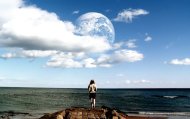Just over a week after astronomers boldly announced
that they would discover an Earth twin elsewhere in the universe within
the year, NASA's Kepler telescop spotted a pretty good candidate.
Unglamorously named KOI 172.02 -- KOI stands for Kepler Object of
Interest -- this planet is the most Earth-like planet astronomers have
discovered yet.
RELATED: Scientists Discover Earth-Sized Planet Just 4.3 Light Years AwayThe differences are slight. It's roughly 50 percent larger than Earth and orbits a star that closely resembles our own sun at a distance that would make the surface of the planet habitable. (The size makes it a "super Earth" rather than an "Earth twin.") With an 242-day long year, it's slightly closer to its star than the Earth is to the Sun but otherwise enjoys all of the same ideal conditions as we do, as far as astronomers can tell. "This was very exciting because it's our fist habitable-zone super Earth around a sun-type star," said Natalia Batalha, a Kepler co-investigator at NASA's Ames Research Center in California. "It's orbiting a star that's very much like our sun. Previously the ones we saw were orbiting other types of stars."
RELATED: Forget Mars: There's Water on Mercury!
In a way, the discovery is a bit underwhelming thanks the recent flurry of exciting exoplanet news. We learned back in October that the closest star system to our own was home to several planets, including an Earth-sized planet. Then at the start of the new year, the team analyzing data from NASA's Kepler planer-finding space telescope announced the discovery of 461 new unconfirmed planets as well as the fact that that the Milky Way galaxy alone was home to more than 17 billion Earth-sized planets. They said they'd find an Earth twin among them by the end of the year. Compared to the days when we didn't know there were any other planets in the universe at all, and suddenly the chances that alien life exists start to look pretty strong. At least that's what the experts say. "It's a big deal -- It's definitely a good candidate for life," said astrophysicist Mario Livio about KOI 172.02. "Maybe there's no land life, but perhaps very clever dolphins."

No comments:
Post a Comment